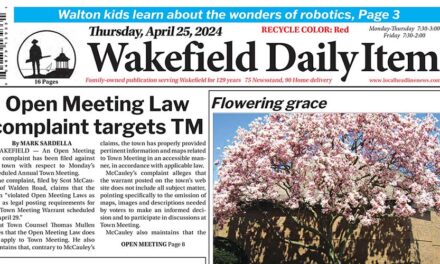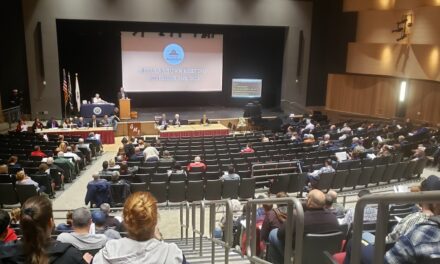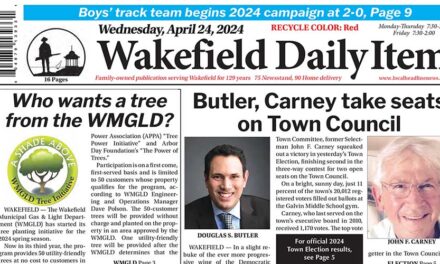Published in the July 10, 2015 edition
WAKEFIELD — In the coming days municipal officials will have a better idea of what they can expect to receive in state assistance for fiscal year 2016.
Gov. Charlie Baker and his administrative team are poring over a proposed $38.1 billion budget passed Wednesday afternoon by the Legislature after negotiations Tuesday between House and Senate representatives.
If a conference committee plan remains intact, Wakefield will get $3,105,666 in unrestricted local aid and $5,401,367 in Chapter 70 funding for local education. These are the two biggest receipt categories, with the unrestricted local aid figure representing an incease of nearly $128,000 over what the town received for fiscal year 2015, which ended June 30. The education figure, if it stays as is, represents an $84,350 increase over last fiscal year’s contribution from the state.
However, Town Administrator Stephen P. Maio explained, the state also charges communities for various things each year, like the cost of sending children to charter schools. Wakefield’s charter school sending tuition assessment is rising to $914,000 in the conference committee budget proposal, up significantly from the $670,000 charged in fiscal year 2015.
Overall, Maio said, “The local aid numbers are basically what we have anticipated. However, I’m going to as (Supt. of Schools Dr. Kim Smith) to look into the charter school situation to see exactly how many kids we’re sending to charters schools, which is essentially the Mystic Valley Regional School in Malden.”
The state spending plan includes measures aimed at strengthening management of the Massachusetts Bay Transportation Authority and requiring lawmakers to sign off before public money could be spent on a potential 2024 Olympics in Boston.
Approval of the budget comes a week after the start of the 2016 fiscal year. The state had been operating since July 1 on a $5.5 billion stopgap budget. The 2016 fiscal year budget would increase overall spending by 3.5 percent over the just completed fiscal year.
The budget also calls for a hike in the state’s earned income tax credit and would boost spending on programs to combat homelessness and the state’s opioid addiction problem.
Baker called the final budget plan “a terrific start.” He has 10 days to review the plan and issue vetoes.
“We should all remember that we started with a $1.8 billion structural deficit when we began this activity back in March,” Baker said. “The Legislature, with my gratitude, chose not to raise taxes and fees to close that budget gap but instead pursued a series of reforms and belt-tightening that we thought was a better way to go.”
Baker said the budget also offers a promising start to the effort to fix the MBTA, which was widely criticized last winter after a series of snowstorms led to widespread breakdowns in public transportation.
Budget negotiators adopted a version of Baker’s plan to create a five-member financial control board, appointed by the governor, to oversee the transit system for the next three years. The budget would also suspend the Pacheco Law, which limits the T’s ability to contract out some services to private vendors, for three years.
Baker said the new tools “are absolutely necessary to provide the riders, taxpayers, businesses and workers of Massachusetts the world class transit system that they deserve.”
Sen. Marc Pacheco, a Taunton Democrat, launched an impassioned 45-minute defense of the anti-privatization law named after him during the budget debate but he failed to persuade his colleagues.
The budget includes language that would prevent state spending on the 2024 Summer Olympics without public hearings and approval by the Legislature. Boston is in the running to be named host of the games, with bids also expected from several other cities including Paris, Rome, Hamburg, Germany and Budapest, Hungary.
The budget provision was quickly dismissed as “smoke and mirrors” by supporters of a proposed 2016 state ballot question that would seek an outright ban on taxpayer funding for the games if they are held in Boston. They said the language merely requires the Legislature to vote on funds for the Olympics, as it would on any other appropriation.
Evan Falchuk, chairman of the group Citizens for a Say, and Geoff Diehl, co-chair of Tank Taxes for Olympics, noted that lawmakers voted down more restrictive language on Olympics spending.
“This is more Beacon Hill double talk,” Falchuk said. “There is no ban to protect the taxpayers.”
Under the budget the maximum credit allowed under the state’s current earned income tax credit, aimed at helping working families, will increase from $950 to $1,459. The tax credit will take effect next year.
The compromise plan did not include a Senate-passed amendment that would freeze the state’s income tax rate at 5.15 percent. Under current law, the tax rate would be allowed to drop gradually to 5 percent.
The budget would also:
— Increase spending on the Massachusetts Rental Voucher Program by $20 million to help homeless families;
— Spend $3 million for 250 new clinical stabilization beds to help recovering addicts;
— Create two new recovery high schools for young drug abusers;
— Let cities and towns buy overdose antidotes like Narcan through a bulk purchasing program run by the state Department of Public Health.
— Steve LeBlanc of the Associated Press contributed to this report.




